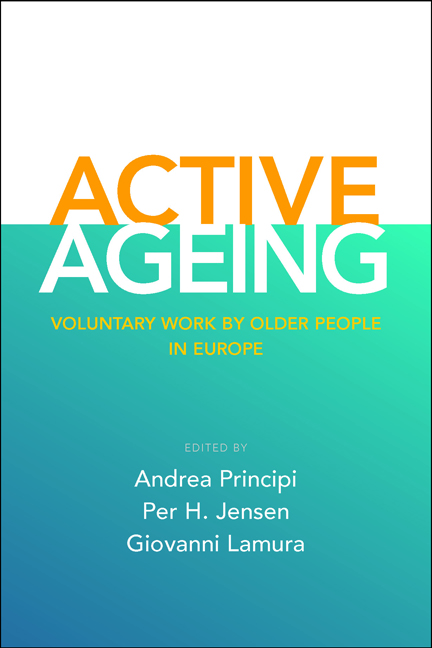Book contents
- Frontmatter
- Contents
- List of tables and figures
- Notes on the contributors
- Acknowledgements
- Foreword
- Part I Realising volunteering by older people in Europe An overarching approach
- Part II Opportunities and restrictions for older volunteers National experiences
- Part III Opportunities and restrictions for older volunteers Case studies in European voluntary organisations
- Part IV Conclusions
- Index
ten - Older volunteers in the Netherlands: new challenges to an old tradition
Published online by Cambridge University Press: 05 March 2022
- Frontmatter
- Contents
- List of tables and figures
- Notes on the contributors
- Acknowledgements
- Foreword
- Part I Realising volunteering by older people in Europe An overarching approach
- Part II Opportunities and restrictions for older volunteers National experiences
- Part III Opportunities and restrictions for older volunteers Case studies in European voluntary organisations
- Part IV Conclusions
- Index
Summary
Introduction
When Esping-Andersen (1990) wrote his famous study on the different types of welfare states, he characterised the Netherlands as a member of the conservative, corporatist family of continental welfare states in Europe. Based on the image of the 1960s and 1970s, this qualification may have been correct. But during the 1980s one could already see the start of a process of the Netherlands drifting away from its continental anchors. During the 1990s it looked like the Netherlands evolved into a mixture of the social democratic and liberal welfare state model, turning the ideas developed by Giddens (1998) about a ‘third way’ into reality. However, after the turn of the century and the rise of populist right-wing political parties, the welfare state came under attack. During the last decade privatisation, market orientation and own risk and responsibility became leading notions with respect to the reorientation of the welfare state. Especially after the budget cut-backs related to the banking and Euro crisis during a long period after 2008 the Dutch welfare state – or what is left of it – will be hardly more than a shadow of what it used to be in the 1980s. In particular, there will be major cut-backs in the field of care, compelling people in need of help to rely more on family members or other people from their social networks.
Compared to other European countries, unemployment has been and still is relatively low, even though during 2012 it increased rapidly. Unemployment hits older workers particularly hard. From all vacancies filled during 2011, only 2 per cent went to people over 55 years old. So, older people becoming unemployed experience more and more that they are likely to remain unemployed for the rest of their life. A growing share of these long-term unemployed start to shift focus and make inquiries as to whether there is an option to do voluntary work. Even though this is unpaid work, it offers them the opportunity to do something useful in society, gives them a goal in life again, and adds to their social network.
Despite growing unemployment, labour market participation in the Netherlands is still high, especially for women. When it comes to the share of women in employment, the Netherlands is close to the Scandinavian frontrunner countries. Yet most women (two thirds to three quarters) work in part-time jobs.
- Type
- Chapter
- Information
- Active AgeingVoluntary Work by Older People in Europe, pp. 217 - 242Publisher: Bristol University PressPrint publication year: 2014

